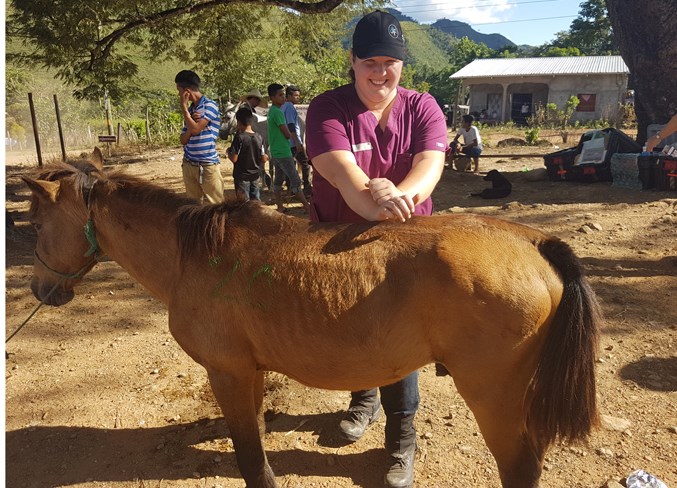Olds College animal health technology instructor Dr. Kelsey Shacker says a trip to Honduras late last year to help students and residents heal horses, donkeys and mules has whetted her appetite to undertake similar trips in the future.
Last November, Shacker and Dr. Katarina Purich, an Innisfail vet, travelled to Honduras in Central America, to volunteer with the Equitarian Initiative.
It's an organization that works with veterinarians around the world to provide health care and education in order to improve the health and welfare of horses, donkeys and mules.
Shacker and Purich were there for 10 days. They primarily examined horses, but also dealt with mules and donkeys during their time there.
For part of that time they worked with a Honduran veterinary school.
"We spent two days at the university doing lectures and basic labs; like, 'here's how you perform a physical exam on the horses.' We were working with 12 students there," Shacker said during an interview with the Albertan.
They also set up clinics.
"We had one in a soccer field and the other one was set up kind of on the side of a mountain in a church courtyard," Shacker said.
"We looked at anywhere from 20 to 70 horses in a day and what was neat about this experience and kind of fits with my teaching mode here at the college was the students were the ones performing the physicals, giving the vaccinations, treating some of the injuries and the wounds, under our direct supervision.
"So watching the students go from minimal horse handling and comfort with them. By the end of the trip they were actually doing fantastic and were getting confident and doing awesome," she added.
After a couple of days of clinic work there, they got on board a bus and drove eight hours to where they conducted clinics with eight students from El Salvador.
"The teaching aspect of it was neat, seeing the students grow," Shacker said.
Shacker doesn't speak much Spanish — the language of Central America — but fortunately some students she dealt with spoke English and were able to translate.
"The whole point of these trips is not for North American vets to come in and perform high-end medicine that we have here," she said.
"It's working with traditions that are down there, providing the veterinarian skills they can continue to work once we've left and continue meeting the locals' needs for that community and that environment.
"So where we have very fancy tools and toys that we can take X-rays with and ultrasounds, that kind of thing, they don't have access to that down there. So what can we do for those horses and mules and donkeys within reason and that's sustainable for that community once we leave?"
Shacker learned some things too.
"One of the coolest things that wasn't on my radar going down there was vampire bats. We don't have them up here. So how do you treat and manage a vampire bat wound that a horse has? So I learned some new tricks that way," Shacker said.
"Not that I'm going to expect to be treating vampire bat wounds on horses in North America but OK, you never know. Who knows?"
Another challenge, she said, was imparting knowledge, yet still being "culturally sensitive."
For example, she came across some horses that had injuries to the hoof area.
"The owners believed it was because a spider bit their hoof area, which caused the injury," Shacker said.
"Based on medicine, we know it's something different, but how do you be culturally sensitive and still help the horse, but not discredit the local beliefs that are there, while trying to educate the owners," she added.
"We worked on treating the horse's pain and managing the problem and not worrying too much about trying to explain the underlying causes, because it's still disease, but here's how we can manage it and here's how you can prevent it in general."
Shacker found a difference in horses there compared to here. In general, she said, horses in North America are basically pets or companions while in Central America they're still generally work animals.
"Their day-to-day job is hauling water, moving cattle, hauling carts full of wood, or whatever," she said, adding horses she saw in Honduras averaged 400 to 500 pounds, compared to 900 to 1,200 pounds in Olds and area.
"The majority of our horses in North America are ideal or on the heavier side. It was hard for us to find a horse down there that was ideal. Most of them were all on the lighter side where you could see their ribs, their spines a little bit more," Shacker said.
"And some of that came from long hours of work, also dealing with more internal parasites or external parasites. So trying to deworm them, treat them for ticks, get their bodies healthy so they can absorb all the nutrients going into them."
Food was also an issue for some.
"When families can't even afford to feed themselves, they'll give their horses what they can, but where's that balance line," Shacker asked. "A lot of the owners are trying to do the best they can for their horses, it's just a different standard in mind than what we'd have up here."
Shacker said she'd like to go on another trip with Equitarian Initiative, perhaps to another country.
"The giving back aspect I think is fantastic," she said.
"I've done international travel before, so seen the Third World countries. It's a shock, but always humbling coming home, knowing what we have. Like we're safe; I can drink the water without worrying. I can drive on a road and not worry about being robbed. The poverty's just not there," she said.



